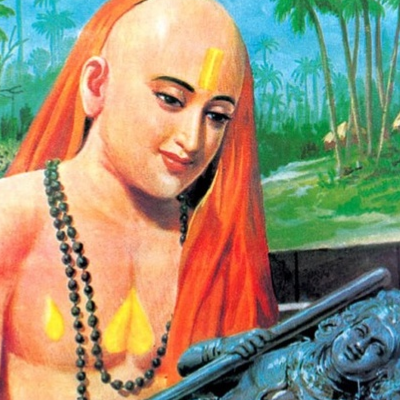No products in the cart.
Sri Madhvacharya Jayanthi 2017

30th
September 2017
(Saturday)
Sri Madhvacharya Jayanthi Starts in : 30/09/2017
Sri Madhvacharya Jayanthi Ends in : 30/09/2017
2017 Sri Madhvacharya Jayanthi

Sri Madhvacharya Jayanthi
Sri Madhvacharya Jayanthi 2017
Sri Madhvacharya Jayanti 2017
Dashami Tithi Begins = 23:49 on 29/Sep/2017
Dashami Tithi Ends = 01:35 on 1/Oct/2017
Madhvacharya (1238-1317 C.E.) – Dashami Tithi of Ashwin Shukla Paksha is celebrated as Sri Madhva Jayanti or Madhvacharya Jayanthi. Sri Madhvacharya was born on the auspicious day of Vijaya Dashami (which is also known as Dussehra) in 1238 C.E. at Pajaka, a tiny hamlet near Udupi.
The followers of Madhvacharya don’t document his death but his departure to Badri at the age of 79 in 1317 C.E. The day on which Sri Madhvacharya proceeded to Badri is celebrated as Madhva Navami which is also known as disappearance day of Madhva Acharya by his disciples.
Madhvacharya was the proponent of Dvaita Vedanta. Dvaita is a Sanskrit word that means “duality, dualism”. The term refers to any premise, particularly in theology on the temporal and the divine, where two principles (truths) or realities are posited to exist simultaneously and independently. Dvaita is a sub-school in Vedanta tradition of Hindu philosophy and is alternatively known as Bhedavada, Tattvavada and Bimbapratibimbavada.
The Dvaita Vedanta school believes that God (Vishnu, supreme soul) and the individual souls (jīvātman) exist as independent realities, and these are distinct. The Dvaita school contrasts with the other two major sub-schools of Vedanta, the Advaita Vedanta of Adi Shankara which posits nondualism – that ultimate reality (Brahman) and human soul are identical and all reality is interconnected oneness, and Vishishtadvaita of Ramanuja which posits qualified nondualism – that ultimate reality (Brahman) and human soul are different but with the potential to be identical.
Dvaita Vedanta sub-school was founded by the 13th-century scholar MADHVACHARYA. Like Ramanuja, Madhvacharya also embraced Vaishnavism. Madhvacharya posits God as being personal and saguna, that is endowed with attributes and qualities. To Madhvacharya, the metaphysical concept of Brahman in the Vedas was Vishnu. He stated “brahmaśabdaśca Viṣṇaveva”, that Brahman can only refer to Vishnu. This is because according to him, Vishnu was not just any other deva, but rather the one and only Supreme Being. Madhvacharya differed significantly from traditional Hindu beliefs owing to his concept of eternal damnation. For example, he divides souls into three classes. One class of souls, mukti-yogyas, qualifies for liberation, another, the nitya-samsarins, subject to eternal rebirth or eternal transmigration and a third class, tamo-yogyas, who are condemned to eternal hell(andhatamasa). No other Hindu philosopher or school of Hinduism holds such beliefs. In contrast, most Hindus believe in universal salvation, that all souls will eventually obtain moksha, even if after millions of rebirths.
Dvaita Vedanta acknowledges two principles; however, it holds one of them (the sentient) as being eternally dependent on the other. The individual souls are depicted as reflections, images or shadows of the divine, but never in any way identical with the divine. Moksha (liberation) therefore is described as the realization that all finite reality is essentially dependent on the Supreme.
Five fundamental, eternal and real differences are described in Dvaita school :
- Between the individual souls (or jīvātman) and God (Brahmātmeśvara or Vishnu).
- Between matter (inanimate, insentient) and God.
- Between individual souls (jīvātman)
- Between matter and jīvatman.
- Between various types of matter.
These five differences are said to nature of the universe. The world is called prapañca(pañca : “five”) by the Dvaita school for this reason.
The distinguishing factor of this philosophy, as opposed to monistic Advaita Vedanta, is that God takes on a personal role and is seen as a real eternal entity that governs and controls the universe.
You can read more about Vedanta Philosophy – The Different Schools of Vedanta here.
